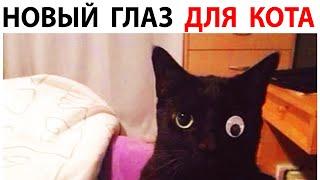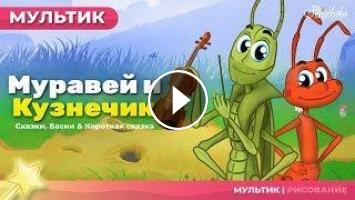Муравей и Кузнечик | Сказка для детей и Мультик
Пожалуйста подпишитесь: https://goo.gl/knc8QX
The Ant and the Grasshopper
The Ant and the Grasshopper, alternatively titled The Grasshopper and the Ant (or Ants), is one of Aesop's Fables, numbered 373 in the Perry Index. The fable describes how a hungry grasshopper begs for food from an ant when winter comes and is refused. The situation sums up moral lessons about the virtues of hard work and planning for the future.
The fable concerns a grasshopper (in the original, a cicada) that has spent the summer singing while the ant (or ants in some versions) worked to store up food for winter. When that season arrives, the grasshopper finds itself dying of hunger and begs the ant for food. However, the ant rebukes its idleness and tells it to dance the winter away now. Versions of the fable are found in the verse collections of Babrius (140) and Avianus (34), and in several prose collections including those attributed to Syntipas and Aphthonius of Antioch. The fable's Greek original cicada is kept in the Latin and Romance translations. A variant fable, separately numbered 112 in the Perry Index, features a dung beetle as the improvident insect which finds that the winter rains wash away the dung on which it feeds.
The fable is found in a large number of mediaeval Latin sources and also figures as a moral ballade among the poems of Eustache Deschamps under the title of La fourmi et le céraseron. From the start it assumes prior knowledge of the fable and presents human examples of provident and improvident behaviour as typified by the insects. As well as appearing in vernacular collections of Aesop's fables in Renaissance times, a number of Neo-Latin poets used it as a subject, including Gabriele Faerno (1563), Hieronymus Osius (1564) and Candidus Pantaleon (1604).
The story has been used to teach the virtues of hard work and the perils of improvidence. Some versions state a moral at the end along the lines of "Idleness brings want", "To work today is to eat tomorrow", "Beware of winter before it comes". In La Fontaine's Fables no final judgment is made, although it has been argued that the author is there making sly fun of his own notoriously improvident ways. But the point of view in most retellings of the fable is supportive of the ant. It is also influenced by the commendation in the biblical Book of Proverbs, which mentions the ant twice. The first proverb admonishes, "Go to the ant, you sluggard! Consider her ways and be wise, which having no captain, overseer or ruler, provides her supplies in the summer, and gathers her food in the harvest" (6.6-9). Later, in a parallel saying of Agur, the insects figure among the 'four things that are little upon the earth but they are exceeding wise. The ants are a people not strong, yet they provide their food in the summer.'
https://en.wikipedia.org/wiki/The_Ant_and_the_Grasshopper
Пожалуйста подпишитесь: https://goo.gl/knc8QX
The Ant and the Grasshopper
The Ant and the Grasshopper, alternatively titled The Grasshopper and the Ant (or Ants), is one of Aesop's Fables, numbered 373 in the Perry Index. The fable describes how a hungry grasshopper begs for food from an ant when winter comes and is refused. The situation sums up moral lessons about the virtues of hard work and planning for the future.
The fable concerns a grasshopper (in the original, a cicada) that has spent the summer singing while the ant (or ants in some versions) worked to store up food for winter. When that season arrives, the grasshopper finds itself dying of hunger and begs the ant for food. However, the ant rebukes its idleness and tells it to dance the winter away now. Versions of the fable are found in the verse collections of Babrius (140) and Avianus (34), and in several prose collections including those attributed to Syntipas and Aphthonius of Antioch. The fable's Greek original cicada is kept in the Latin and Romance translations. A variant fable, separately numbered 112 in the Perry Index, features a dung beetle as the improvident insect which finds that the winter rains wash away the dung on which it feeds.
The fable is found in a large number of mediaeval Latin sources and also figures as a moral ballade among the poems of Eustache Deschamps under the title of La fourmi et le céraseron. From the start it assumes prior knowledge of the fable and presents human examples of provident and improvident behaviour as typified by the insects. As well as appearing in vernacular collections of Aesop's fables in Renaissance times, a number of Neo-Latin poets used it as a subject, including Gabriele Faerno (1563), Hieronymus Osius (1564) and Candidus Pantaleon (1604).
The story has been used to teach the virtues of hard work and the perils of improvidence. Some versions state a moral at the end along the lines of "Idleness brings want", "To work today is to eat tomorrow", "Beware of winter before it comes". In La Fontaine's Fables no final judgment is made, although it has been argued that the author is there making sly fun of his own notoriously improvident ways. But the point of view in most retellings of the fable is supportive of the ant. It is also influenced by the commendation in the biblical Book of Proverbs, which mentions the ant twice. The first proverb admonishes, "Go to the ant, you sluggard! Consider her ways and be wise, which having no captain, overseer or ruler, provides her supplies in the summer, and gathers her food in the harvest" (6.6-9). Later, in a parallel saying of Agur, the insects figure among the 'four things that are little upon the earth but they are exceeding wise. The ants are a people not strong, yet they provide their food in the summer.'
https://en.wikipedia.org/wiki/The_Ant_and_the_Grasshopper
- Категория
- Советские мультфильмы









Комментарии